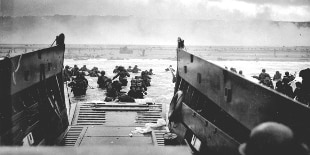Share
June 6, 2020 On June 6, 76 years ago, the Allies landed in Normandy, starting the long bloody battle that will lead to the conquest of Paris on August 25 and, many months later, to the definitive collapse of Nazi Germany. Every year, from that June 6, 1944, the anniversary is celebrated (in France, but not only) because it was from that adventurous and in many ways risky military operation that the final phase of the Second World War started (of which precisely in these days, June 10, marks the 80th anniversary of the entry of Mussolini's Italy into the conflict)."The longest day," German general Erwin Rommel called it. And 'The Longest Day' is also the title of an essay published in 1959, and above all of a legendary 1962 film with an extraordinary cast, from John Wayne to Sean Connery, from Henry Fonda to Robert Mitchum. The contingent involved in the landing was massive: 5,000 ships and amphibious vessels, 104 destroyers, 130,000 soldiers (mostly British and US) and 20,000 paratroopers who launched beyond enemy lines.
The exceptional images of the landing are due to the great photographer Robert Capa, who arrived on the French coast heavily guarded by the Germans together with the first, brave American soldiers. But of that reportage made at the risk of life, unfortunately very few photos were saved, due to the error of a laboratory technician in the development phase of the rollers. So, in the collective imagination, the scenes of that dramatic landing belong today to Steven Spielberg's film 'Save the soldier Ryan' (1998), and in particular to the first 20-30 minutes of the opera, with blood, explosions, the whistling bullets, the mutilated limbs and the innumerable corpses that made the sea water red on the shoreline of Omaha beach.
The Omaha massacre, writes the British historian Antony Beevor in the ponderous book 'D-Day: the battle that saved Europe', became "a sort of American myth, but in subsequent battles there would have been an even more cruel truth than this Legend: In Normandy, the average losses per division on both sides (allies and Germans) would have exceeded those suffered by the Soviet and German divisions during an equivalent period of clashes on the eastern front. German losses in Russia were on average just under 1,000 men per month per division; in Normandy this figure rises to 2,300 men. Allied losses in Normandy were close to an average of 2,000 men per month per division. "
Pence: we will never stop honoring the great generation
"We will never forget or stop honoring the sacrifice of those who have not returned home and our nation will be forever grateful for the courage and service of the greatest generation". The American vice president, Mike Pence, tweeted it on the anniversary.
Trudeau: Thousands of Canadians changed the course of history
"76 years ago, thousands of Canadians stormed Juno Beach and changed the course of history. Today on D-Day76, we remember their courage and the sacrifices they made in order to to enjoy the peace and freedom we care so much about. " Canadian Prime Minister Justin Trudeau tweeted this on the occasion of the anniversary of the Normandy landings.

